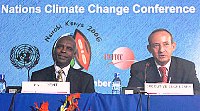UN climate change official expresses optimism about developing countries
A top UN climate change official expressed optimism about developing countries' willingness to enter into talks on a new agreement to limit greenhouse gases.

Yvo de Boer, executive secretary of the United Nations Framework Convention on Climate Change, said that key developing countries South Africa and Brazil had shown more willingness to talk about future measures and that "prospects are good" for beginning talks on a post-Kyoto agreement.
"That's an indication from two very important developing countries that they are willing to engage in talks about the future," he said at a press conference concluding a two-week meeting of more than 1,000 diplomats from 190 countries.
I think there are quite encouraging signals from both developed and developing countries that they are willing to go to the next level."
Ideas raised at the preliminary meeting in Bonn will be put before a larger meeting in December in Bali, Indonesia, when U.N. officials hope to launch formal negotiations. The aim is to also draw in the United States, the world's largest polluter, which refused to accept the mandatory limits of the Kyoto system, and emerging giants like India and China, which were exempted from Kyoto obligations, U.N. officials say.
Developing countries, including heavy polluters such as China, argue that most of the carbon dioxide emissions believed to cause global warming came from the richer industrialized countries in past years and that they should not bear the burden for that. De Boer said that stance meant that financial assistance and incentives for investment in cleaner technology in developing countries would be of crucial importance.
"Developing countries meeting in Bonn have been making it very clear that the problem the current high level of greenhouse gas emissions in the atmosphere was caused by the North and should not be pushed onto the South," de Boer said.
"They are insisting on their right to economic growth and poverty alleviation," de Boer. This is why the issue of economic incentives to green investments in developing countries is so important."
Richer industrial countries have vowed to reduced greenhouse gas emissions by 5 percent below 1990 levels by 2012; the European Union has promised to cut emissions by 20 percent on their own by 2020, and by 30 percent if another international agreement can be reached.
Subscribe to Pravda.Ru Telegram channel, Facebook, RSS!


